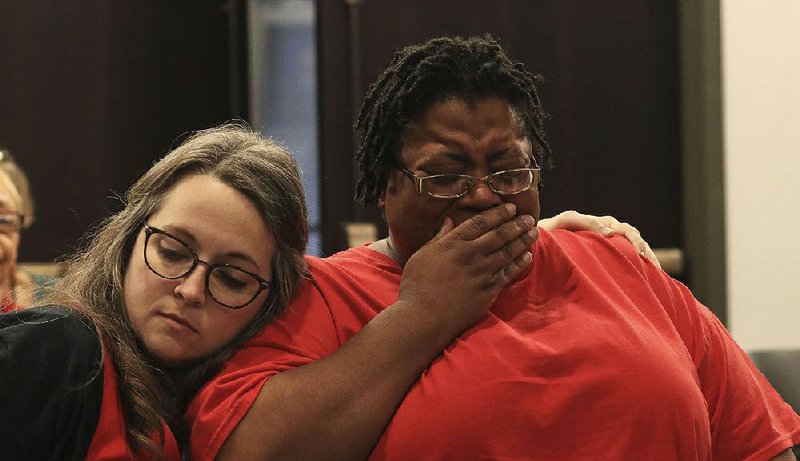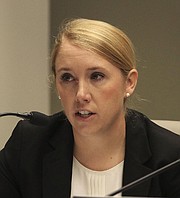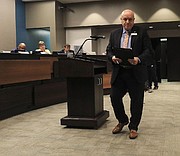The Arkansas Board of Education voted Friday for a framework that will -- in the event the state-controlled Little Rock School District does not meet previously set exit criteria -- return the district to a nine-member locally elected school board that would have limits on its authority.
Gov. Asa Hutchinson later on Friday applauded the Education Board for the framework, which calls for a November 2020 election of a Little Rock School Board.
"This is an important step in the return to local control with continued support from the state," Hutchinson said in a statement. "The Board has been attentive to the public meetings on the future of the LRSD and has set forth a framework that puts the children first and gives our students the best opportunity for success in the future."
The Education Board's unanimous vote on the half-page framework it received Friday morning was followed with a surprise motion to end the Little Rock district's decades-old recognition of the Little Rock Education Association employees union as the exclusive contract bargaining agent for district employees, effective with the Oct. 31 expiration of the teachers' existing negotiated agreement or contract.
The motion to end union recognition -- made by Education Board member Sarah Moore of Stuttgart, a former aide to Gov. Asa Hutchinson -- produced angry outbursts from audience members before the board tabled it for lack of public notice.
The union recognition issue will now be considered at the Education Board's Oct. 10 meeting. The Education Board did vote to direct that an outside agency be selected to oversee the election of teachers to a personnel policies committee that would presumably replace the union representation.
Audience members who were unhappy with the framework plan for return to local control became incensed with the proposal to end recognition of the union as the exclusive contract bargaining agent.
"You're a criminal, Dr. Moore!" was part of the shouted outcry. "Who is paying you, Dr. Moore?"
Teresa Knapp Gordon, president of the association and a library media specialist, recited back to the Education Board its frequent call for making decisions based on what is best for students.
"You are not putting students first," Gordon told the board, adding that for the past 4½ years of state control of the district, educators in the district -- 70% of whom are association members -- have shown up for work and put children first "through every single detrimental thing that has been done to us."
Before the vote, Clarke Tucker, a former state lawmaker, predicted that the proposal if approved Friday would result in no school for Little Rock students on Monday, implying employees would strike. He said it would be wrong to act on the proposal that affected people who were at work in their schools and unaware of the issue.
Superintendent Mike Poore, the Little Rock School District's state-appointed superintendent, told the board that the motion "is setting ourselves up to create tremendous disarray in our community" that will extend into school board election season next year.
"It will go back to control-type issues rather than a focus on what needs to happen to improve the education environment," he said.
Poore added that he believes the Education Board members sincerely want the district to improve but "we are not really listening to everything that is happening. You may not be paying attention to me right now either and I will have to take stock in that."
Poore also asked that the Education Board seek public comment -- such as a survey -- to get reaction to the framework plan, which he said is fluid and in need of detail.
THE FRAMEWORK
Moore also made the motion earlier in the Friday meeting to approve the framework plan for reconstituting the Little Rock district in the event it does not meet exit criteria by Jan. 28, 2020.
That is the expiration of the five-year deadline for the 23,000-student district to correct the problems that resulted in the state board in 2015 dismissing the locally elected school board and placing the superintendent under the direction of the state's education commissioner.
In 2015, six of the district's then 48 schools were labeled as academically distressed based on chronically low student scores on state math and English/language arts exams.
Current state law and accompanying rules call for a district under state authority to either meet state-set exit criteria for regaining a locally elected school board or face the permanent "consolidation" or "annexation" of the district to one or more other districts, or be "reconstituted."
"Reconstituted" is not defined in state law. That resulted in state Education Board members calling in recent weeks at public forums and on surveys for ideas on how the district might be reconstituted in the event the district or its eight schools that have state-issued F letter grades do not meet all of the exit criteria.
The exit criteria -- announced earlier this year -- center largely but not entirely on ACT Aspire student test results. It will be as late as Oct. 15 before a determination is made by the state on whether the district has met the exit criteria.
The Education Board on Sept. 11 directed state Education Secretary Johnny Key and his staff to draft a framework for the district that was based on common themes heard from the state board members and the public.
The framework will be fleshed out at coming regular meetings of the state Board of Education meeting, starting in October.
Key said a lot of the decisions that are still to be made hinge on the letter grades and school data to be released in October.
"Today the State Board of Education took action that is in the best interest of students who attend the Little Rock School District," he said in a prepared statement after the meeting.
"The board did not make this decision lightly, as evidenced by the countless hours each member spent listening to public feedback, responding to numerous emails, and asking detailed questions," he said. "I commend the board for its diligence, for weighing all the facts, and for ultimately making a decision that balances local control and the constitutional responsibility of the state. I stand behind the board's decision and am committed to implementing this framework with students at the forefront of all future efforts."
The newly approved framework calls for the November 2020 election of a nine-member school board that would have a level of authority set by the state Education Board or might operate under the direction of the state's education secretary.
The school district currently has seven school board election zones, making it necessary for new zones to be configured for that November election. The zone lines would have to be redrawn again in 2021 or 2022 to reflect population shifts uncovered by the 2020 U.S. census. For a November 2020 election, the school board candidate filing period would be July 26 though Aug. 1, 2020.
SCHOOL CATEGORIES
The framework calls for three categories of schools. Category 1 schools would be those that have a 2019 state letter grade of D or better. Again, those letter grades will be announced next month. Category 1 schools would be operated by the nine-member school board.
Category 2 schools are those that are undergoing reconfiguration, and they may be operated by the local board. The state Education Board will determine the schools to be put in that category.
The district has made plans in the wake of opening the new Southwest High School to convert the existing Fair and McClellan High School buildings into kindergarten-through-eighth-grade campuses. There are also plans to discontinue traditional school use of Henderson and Cloverdale middle schools, as well as Romine, Baseline, Meadowcliff and David O. Dodd elementaries over the next one to two years.
Key said Friday that district schools that are affected by the reconfiguration or closing of campuses may be ones placed in Category 2. He said he wanted to honor the recent work that the district has done in regard to facility planning.
Category 3 schools would be those with a 2019 F letter grade. These schools will operate under "different leadership than the remaining schools in the district, but in partnership with the district."
Key suggested a partnership might entail the locally elected board making transportation and food service decisions for the Category 3 schools while the state education agency might make decisions on curriculum and personnel.
Education Board Chairman Diane Zook of Melbourne and Little Rock said the framework responds to the call by many members of the public to return the district intact to the local board and she hoped that by the time of the November 2020 election there would be no F-graded schools.
Not everyone in the audience agreed that the district would be returned in whole to local control -- particularly in regard to what might be Category 3 schools.
Anika Whitfield, a leader of the Grassroots Arkansas organization that has long opposed the state takeover of the Little Rock district, told the board that they are holding the residents of the district hostage.
"You are harming our children. You are ruining our city. We want our district back now," Whitfield said.
Sen. Joyce Elliott, D-Little Rock, said the plan will deliberately perpetuate a divide in the city and district, along Interstate 630, with schools north of the interstate operating largely unaffected with a locally elected school board.
"Why is it that you would ever vote for something where maybe half of the city will have a school board and the other half of the city would be under the thumb of somebody else -- we have no clue who it is going to be or what it is going to be," Elliott said. "Return the school district whole. Treat everybody with dignity and respect. That is not what this does. "
Poore, the superintendent, appealed to the Education Board to recognize the work that the district and state's Elementary and Secondary Education Division have done together in the past year in academically struggling schools, particularly in terms of teacher support and evaluations.
"I worry that this Category 3 option will undermine or take that away from us," Poore said. "Again, it doesn't necessarily say that, but that is my concern, and I would think we would want to vet this in a deeper way and seek public opinion."
Key and Zook offered assurances to the board members and the audience that the public can continue to comment on the future of the district, including the framework plan, via email and at future Education Board meetings.
Education Board member Susan Chambers of Bella Vista, calling in to the meeting from Hawaii, asked if the language about "different leadership" for Category 3 schools could be changed to "additional leadership." Moore declined the change in her motion to approve the framework.
COLLECTIVE BARGAINING
In regard to ending recognition of the Little Rock Education Association as the contract bargaining agent, Moore called for the establishment of a personnel policies committee in the district that would be similar to committees that are required by law for all other school districts in the state.
The personnel policies committees are made up of teachers who are elected by their colleagues and district administrators. The committees respond and offer advice to school boards on teacher-related matters, including salaries and policies.
Until this year, state law exempted Little Rock from having a personnel policies committee because the district engaged in collective bargaining. That exception was eliminated earlier this year by Act 728.
Education Board member Chad Pekron, a Little Rock lawyer who lives in Bryant, made the motion to table Moore's proposal, saying that he favored the withdrawal of union recognition but was uncomfortable with the lack of notice given to the public about it. Education Board member Fitz Hill of Little Rock seconded it.
The Education Board followed the vote to table with a motion and vote to direct that a third party begin the process of setting up the election of a personnel policies committee in the Little Rock district.
Gordon, the president of the employee association, said after Friday's meeting that the association and Poore had already submitted a timeline to Key, who acts in lieu of a school board in the state-controlled Little Rock district, on an election of personnel policy committee members. She said any personnel policies committee would serve as an advisory organization to the union.
Key said through a spokesman Friday afternoon that he had received the election plan but had objections to it.
"Any certified or classified employee interested in serving on the PPC, regardless of their union membership status, should have a sense of fairness in the election process. This proposal conveys a sense of union control that could have a chilling effect on participation," he said.
Gordon said she was shocked and angry about the proposal to end recognition of the organization. And, she called the Education Board vote to have an independent third party oversee an election of teachers to the personnel committee a violation of state law.
Arkansas Code Annotated 6-17-203 states that the classroom teacher members of each school district's committee on personnel policies shall be elected by a majority of the classroom teachers voting by secret ballot. It also says "the election shall be solely and exclusively conducted by the classroom teachers, including the distribution of ballots to all classroom teachers."
Zook said Friday that the short public notice for Friday's special meeting was the result of when board members could be available. She also said individual Education Board members met with department staff about the framework.
Key said that those conversations centered on concepts and not a written plan.
A Section on 09/21/2019



